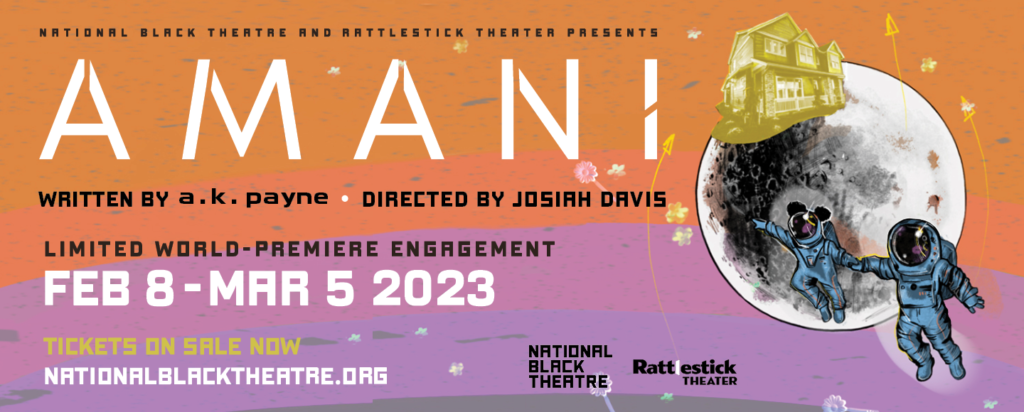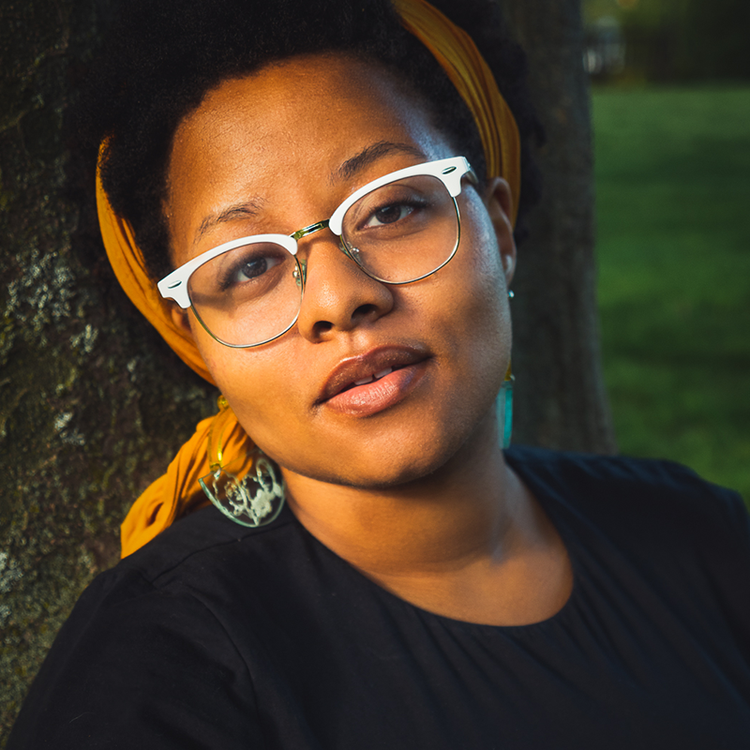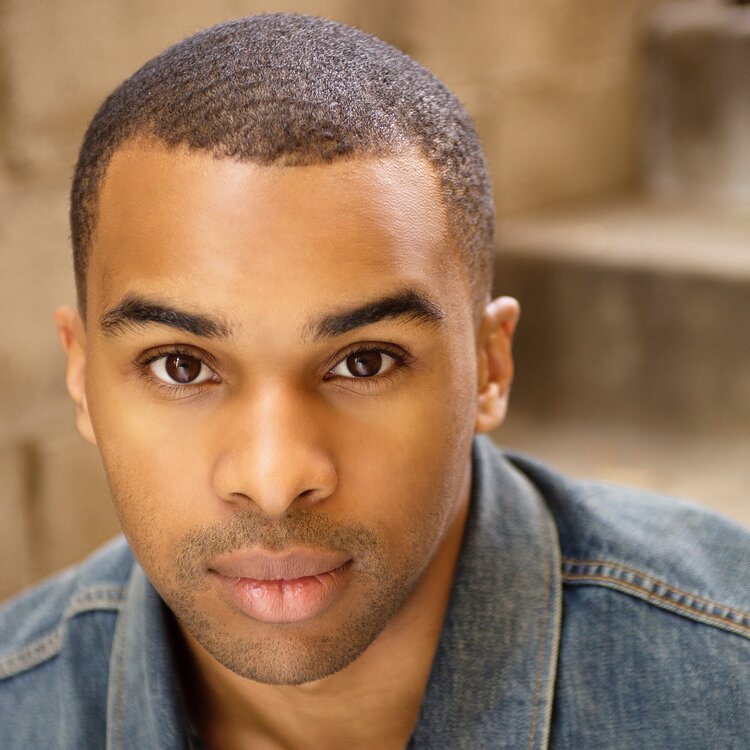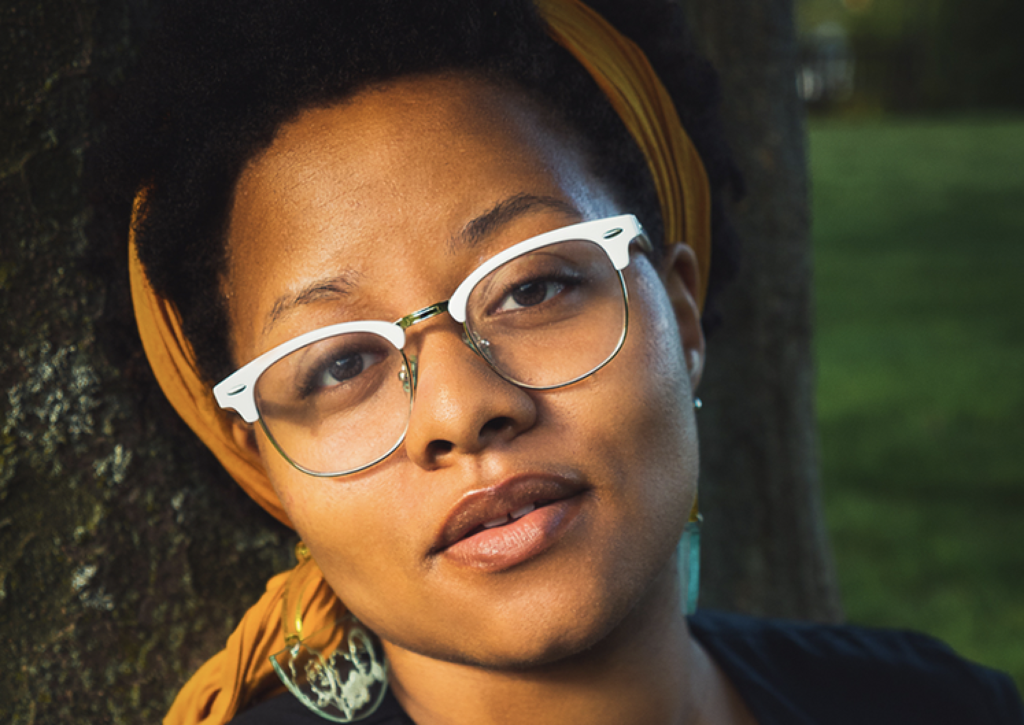Inside the world of ak payne’s new play, Amani
National Black Theatre’s first co-production of its 2023 season, AMANI, is now on through March 5, 2023 at Rattlestick Theater in Manhattan’s Greenwich Village.
Inspired by the true story of an imprisoned parent, AMANI is an exploration of the ways incarceration has impacted Black communities, and how individuals affected permit themselves to dream in the midst of such constraints. Set in an afro-futuristic world, AMANI masterfully dissects the concept of space as it pertains to one’s own body and the greater cosmos, revealing a much deeper narrative that evokes our collective imagination to reflect on the limitlessness of possibility in the pursuit for freedom.

Playwright a.k. payne (FILLING BASINS, where the pathways meet) and Director Josiah Davis (Julius Caesar!, Wolves Eat Elk) have brought into being a production embodying compelling themes of today such as how individuals and communities affected by incarceration can reclaim themselves and harness their own innermost potential.
We caught up with AMANI‘s playwright, ak payne (she/they) and director, Josiah Davis (he/him) to find out more about the production, with the play currently having its world premiere in New York City.
What was the inspiration for this play, ak? What is your personal experience with the subject matter?
ak payne: Around the time that I began writing AMANI, I was growing a plant I named Neveah, after heaven. I was also reading Robin D.G. Kelley’s Freedom Dreams: The Black Radical Imagination, thinking about outer space and about the ways my communities have named and carved out home. I was thinking a lot about healing, about the space afforded to folks socialized as black girls for healing, for tenderness, for figuring it out. For time. So often black girls are grown before they know what hit them, quick quick like blink of an eye. This world’s constraints and systems snuff out and stifle black girls epic dreams before we get a chance to actualize. I wanted a room capable of holding infinite time: for me of yesterday, for my cousins, for my friends. I wanted a story in which i could explore my own growing questions and frustrations around these prisons of many shapes that seek to control, police, and contain Black life and Black freedoms: the actual, literal prisons in which i have seen my family members go and return inevitably scathed; the prison of the gender binary in which i find myself fighting to be seen, witnessed, whole; the prison of the English language which so often feels deeply insufficient in truly getting at the heart of the matter, the spirit of the thing that lives so viscerally within the body—that me and mine have known before we spoke in this colonizer’s tongue; the prisons of heteronormativity, of capitalism and the prison of the city: the space where in our migrations and flights and freedom-seeking we have sometimes become disconnected from the land and from ourselves. in her becoming, Amani comes face to face with all these prisons as she grows her own garden, as she builds her own ship.
What inspired your decision to set the play in the future? How does this connect with themes of gender and the binary?
ak payne: This play is set in the past, present, and future. It is set in both all and no time. I am interested in the ways that the afrofuture contains our histories and memories as well as our dreams. By exploding linear conceptions of time, by acknowledging the interdependence of all temporal modes, I think we free up space to imagine beyond black and white binaries of all kinds. The past breathes within us. The future echoes back. My dream future is queer, is non- binary, genderfluid and contains space for my friends and communities to fully be in our own bodies, to live and breathe and name ourselves on our own terms.
Josiah, what appealed to you most in ak payne’s play — characters, themes, narrative, style? Why did it feel like a story for now?
Josiah: I read this play for the first time in the depths of 2020. When I read it my body had a pretty visceral reaction. My heart beat slowed and I began to breathe deeper. This story asks for sensitivity, stillness, and vulnerability. I believe we need more of this in our world today. This story is full of affirmations. It asks us, Black people specifically, to be our full, whole, unlimited selves. This story asks us to listen to our body, what it needs, where freedom lives inside of it. This story asks us to queer time. For us to allow time to be in flux and circular rather than linear. It asks us to build a world that has never existed. As a director, that is one of the most exciting endeavors
Can you share some of your vision for casting, design, and the creative realization of AMANI?
Josiah: This play is all about dreams, breaking boundaries, and amplifying possibility. So my goal was to infuse these values into every aspect of design. I believe the cast that we curated is full of heart and is exploring these values in their everyday lives which allows the text ak payne wrote to really sing! My goal for this experience is to push beyond the theatrical. My hope is that we are at the intersection of theatre, concert, art installation, and dance. Even our band is breaking boundaries by employing tactics to produce unconventional sound from their instruments for us to infuse into our world. This story takes place in a kaleidoscope of Amani’s memory. We are in Amani’s house, on Amani’s spaceship, in Amani’s garden, in Amani’s mind, and in Amani’s outer space, Amani’s sanctuary. So we had to create an environment that could be everything everywhere all at once.
As a director/choreographer can you describe your personal and preferred approach to directing theatre works?
Josiah: My approach for creation is highly collaborative. Although I may have a vision for telling any given story, I never assume I have all the answers. While generating a story about possibility we must keep living in the question. I try to cultivate a space where actors and designers feel empowered to express their thoughts and ideas. The collision of these ideas created a potent and nuanced articulation of a new world. This is even more important when I, a cis black man, is attempting to embody the internal life of a black femme human. I am very aware of my identity
and its shortcomings so I put a lot of energy in surrounding this process with as many black women as possible.

a.k. payne (Playwright)
a.k. payne (she/they) is a playwright and theatermaker with roots in Pittsburgh, Pennsylvania. Her plays love on and engage the interdependencies of Black pasts, presents and futures to find/remember language that might move us towards our collective liberation(s). They hold a B.A. in English and African-American Studies from Yale College and are currently pursuing an MFA in playwriting from Yale School of Drama. Their work has been finalist for the L. Arnold Weissberger New Play Award, semifinalist for the O’Neill National Playwriting Conference and winner of the David Mark Cohen National Playwriting Award. Their plays have been workshopped with Manhattan Theater Club‘s “Groundworks Lab” and Roundabout Theater Company. In all their work they strive to create abundant space for Black folks’ freedom dreams, in community.

Josiah Davis (Director)
Josiah Davis (he/him) is a director, choreographer, performer, designer whose work intersects expressive movement, live music, emerging technology and ritual to breathe new life into physical storytelling. He is the Associate Artistic Director of On The Verge Theatre Company-Santa Barbara, a New York Theatre Workshop 2050 Fellow and a Theatre Lumina company member. He received an MFA from Brown/Trinity Rep in Directing and a BA from UCLA School of Theater, Film, and Television.
Tickets to and more information about AMANI here.






